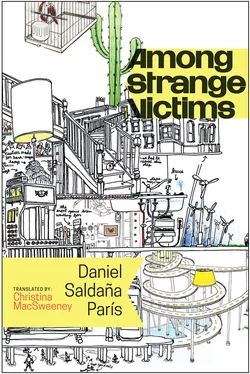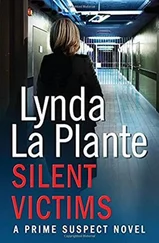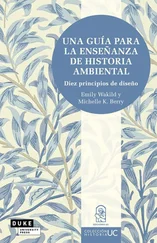The festivities lasted a weekend, and then we returned — having taken the Monday off for her to move into my apartment — to our respective posts at the museum. I am now sitting at my desk while she looks at me, and I can’t get my head around the idea that the secretary, Cecilia, that woman who wiggles past on her way to Ms. Watkins’s office, is my legally recognized wife, whom I have to watch from my uncomfortable wooden chair while typing letters to no one.
When we leave the museum, we walk hand in hand to the metro. In the carriage, we stand in shy silence, and I pass the time looking at the faces of the other travelers while my hand rests on Cecilia’s right buttock. She seems grateful for this slight contact, which, from her perspective, saves her from the ignominy of being single, so she smiles secretly and, when the crush becomes oppressive, rests her head against my chest. When we come up from the metro, we walk along the less busy streets in the neighborhood. We stop off briefly at the corner store and buy a sugary treat for after dinner. (I have a suspicion that this custom, repeated over decades of wholesome matrimony, will result in consensual diabetes that we will both accept almost without complaint.)
That’s the way it’s been for a whole week. Today is, at last, Friday.
The apartment is a bit small for us, so I’m glad to have never bought large furniture, except for my wooden bed and the chest of drawers that holds my clothes in a knotted mess. Cecilia brought a flat-pack wardrobe from her parents’ home and many boxes with holiday souvenirs, which we’ve put in the tiny storage room on the roof. (That space, I have to admit, was her discovery. I was scarcely aware I had the dirty, peeling storeroom, full of cobwebs, that now holds my wife’s boxes of Veracruz key rings.) She also brought some kitchen utensils, inherited from her mother: a frying pan, two saucepans, a Teflon spatula, and a pewter spoon. There were hardly any wedding gifts; I was very explicit in that respect. Instead, I asked all the relatives — both hers and mine — to give us cash, to add to our savings so we could eventually move to a decent residence. Of course I don’t have the least intention of leaving my apartment, my vacant lot. I put the money we received in a metal box in the wardrobe Cecilia brought with her, keeping it for a rainy day. The office, I realize, makes one humiliatingly prudent.
Cecilia, for her part, hasn’t taken a single look at the vacant lot. I doubt if she has even noticed its existence. While she’s sitting in the living room, battling with the rabbit-ear antenna on the TV in order to watch her game shows, I go to the bedroom, on the pretext of reading, and look out the window at the lot. Now, for instance, I’m scrutinizing it in search of the hen. But she doesn’t appear. The muffled sound of the television filters through from the living room, mixed with Cecilia’s laughter, which leads me to suspect she’s managed to tune in to some program where the contestants are constantly humiliated.
Just as I’d predicted, Cecilia forcefully suggested we take down the tea bags I’d stapled to the wall opposite the bed. After a short exchange of words on the matter, I gave in, resignedly. I bought a couple of pints of whitewash and painted over the brown stain left by the tea bags until it disappeared. In place of my tea bags, Cecilia hung a hideous still life, the only wedding present that didn’t comply with my request: some purple flowers in an earthenware vase, a clumsy imitation of Diego Rivera’s essentially despicable creations. The painting was given to us by one of her aunts, who considered my idea of asking for cash to be — as she expressed it — in poor taste.
Apart from that elderly aunt, embittered by stereotypical widowhood and rancor, my in-laws have treated me well. Don Enrique, being old-fashioned in his ways, considers being married to his daughter an enormous sacrifice on my part (and he’s not completely wrong), and so is continually making me aware of his profound gratitude. One of the ways in which he believes he is repaying the favor is by showing me how to do repairs around the house: during our wedding day, he started explaining how to deal with a leak if you can’t find the valve. I, feigning interest, asked if he knew how to get rid of damp, which must have been a moment of pure joy for him since he immediately assured me he would take on the task of sorting out the problem, especially as his daughter would now be living with me in the apartment. So on Saturday morning, instead of walking to the gazebo to sit contemplating the various speeds of the passersby, or dedicating the morning to pampering the hen with special seeds, I’ll have to wait for my father-in-law to stop by to assess the state of the walls.
Cecilia is twenty-nine, two years my senior. Nevertheless, we both look older. My total lack of a life plan and my haste to be a grown-up left the stamp of frustration on my features. My wife, for her part, comes from a family environment in which passing twenty-two without having at least one child is a sign of ingratitude — I don’t know for what — or a lack of Guadalupian virtues. She was, at twenty-nine, the black sheep of a multitudinous family that understands marriage as an early rite of passage into adult life. It may be that the pressure from her extended family, in that sense, is responsible for the fact that she perpetually has a slight look of disgust — a haughty upper lip. Even now, when she’s laughing her head off in front of the TV in our living room.
Little by little, I’m losing all those small details that, until recently, I’d considered to be indispensable, all those minutiae I’d come to count as features that matched my slightly grubby character: the tea bags, the damp in the living room, the laudable undertaking to walk back to my apartment, and the dead, inane Saturdays in the oval gazebo, dreaming of impossible statistics that depict me as the center of the universe. All this, which until just recently could be considered a protean identity, a fluctuating but almost organic extension of my own body, is now at the point of extinction. In exchange, I have the DVD player Cecilia bought to watch her pirate videos on, and sexual activity I don’t have to pay money for (at least in the short term) and which I can enjoy almost anytime I want, excluding the hours devoted to TV and, for now, the office.
I evaluate the advantages of this apparently irreversible tradeoff and decide I didn’t do too badly: when you come down to it, I can store my collection of tea bags in my chest of drawers and staple them up again in around ten years’ time when Cecilia will have completely given up on the idea of modifying my habits.
Perhaps the most serious thing this pact entails — except for my wife’s sour breath in the mornings — is the great, and now insuperable, distance that has opened up between my mother and me. In the past, despite her explicit repudiation of my major decisions, my mom retained a filament of enthusiasm for having given birth, just over a quarter of a century ago, to a relatively functional son. Now, given that a deceptively golden wedding ring adorns my finger, tying me, like a prison tattoo, to a way of life she disapproves of, her expectations have been notably devalued. We don’t speak so often on the phone now, and when we do, her voice acquires the same tired tone she used when I was a boy and she, taking refuge in a migraine, would send me to my room, giving rise to a sharp pang of sadness inside me.
She reproaches me, of course, for not having studied something. And not just anything, naturally: a profession with demonstrable social utility would have been her choice for me. A lawyer, a rural doctor, or even an economist, just so long as I opted for a project that would include the most vulnerable communities. Anything, in fact, that would demonstrate I was concerned about giving continuity, during my lifetime, to her now-diminished desire to change the world. My mother holds youth in very high esteem since hers was intense and madcap, very much in keeping with the times. She therefore hoped my youth would act as a culture medium for a sensitive, decisive character, and not be a fleeting preamble to obesity and tedium. From her point of view, ingenuousness is a concept to be defended during at least the first thirty years of existence, and for a couple of years more that characteristic should translate into a sustained interest in changing the world, even if you then relinquish that desire. The fact that I, from early adolescence, and once my flirtation with drugs was behind me, had begun to exhibit a prebureaucratic attitude as if affiliating myself to the most insipid strand of character, causes my mom a sense of disillusion equivalent to dishonor. My marriage to a secretary — even though she, my mother, would never dare admit it — is the last straw.
Читать дальше









